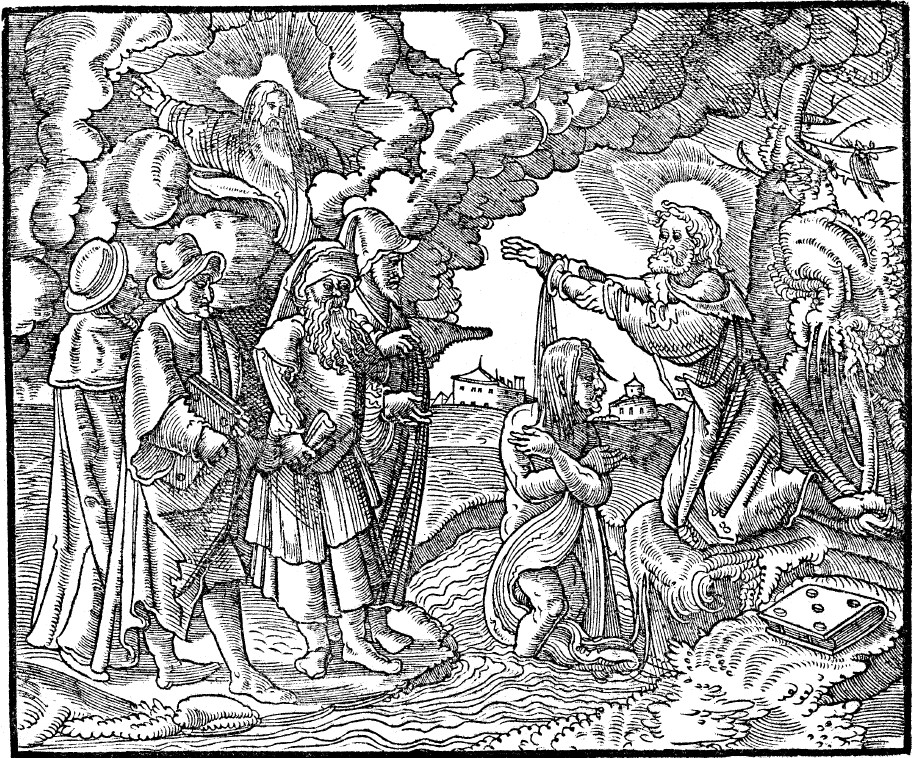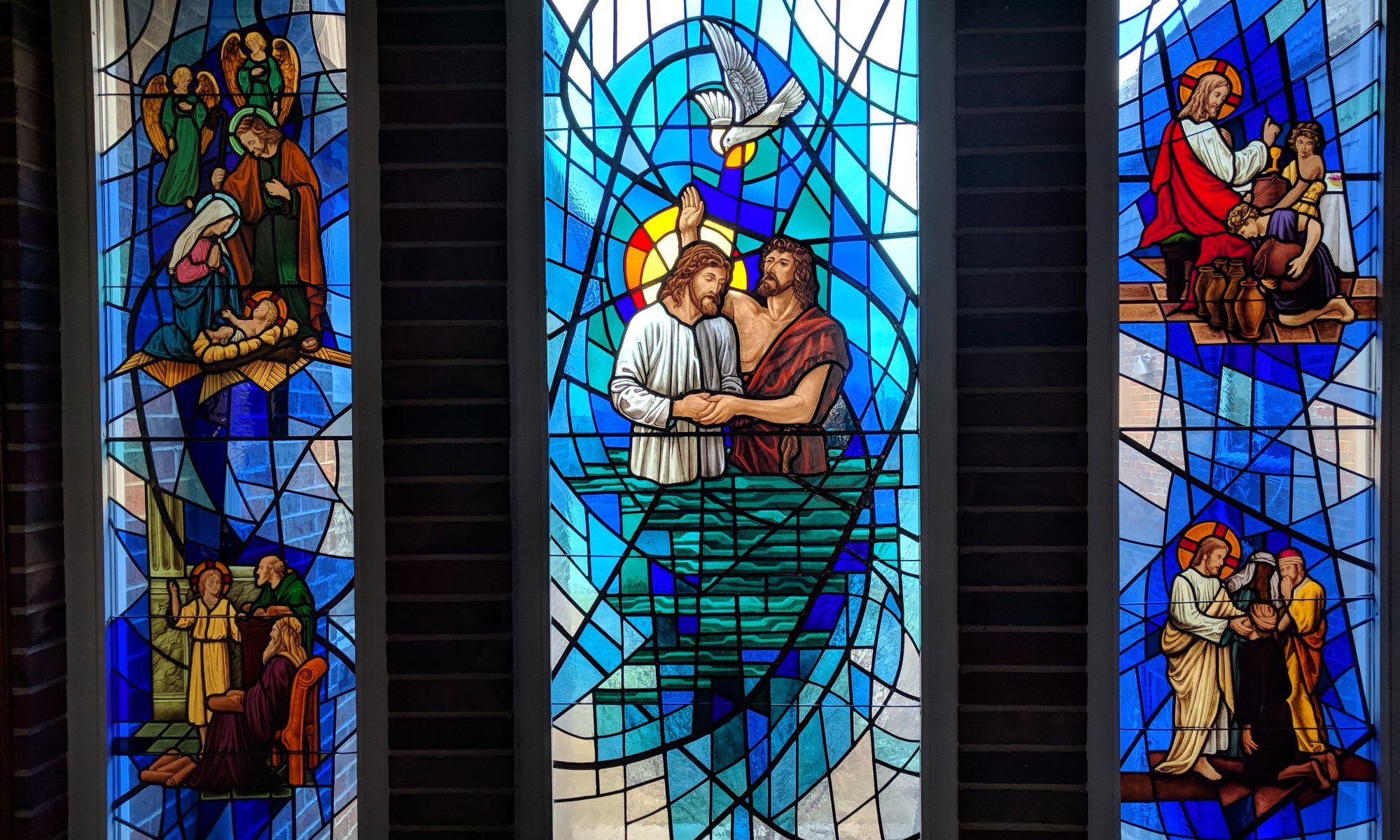
Lessons: Deuteronomy 18:15-19, Philippians 4:4-7, John 1:19-28
Hymns: LSB 357, 347, 352, 334, 386
Grace, mercy, and peace to you from God our Father and our Lord and Savior, Jesus Christ. Amen.
God raised John the Baptist up to be a special kind of prophet. He was prophesied in the Scriptures to come. You see, virtually all prophecies are centered on Jesus or things that will happen in the future involving God’s people (such as Daniel’s prophecies of what would take place between the last OT prophet and Jesus’ birth, Jesus’ prophecy of the destruction of Jerusalem, and the Bible’s many prophecies concerning the End Times). But John is prophesied as we heard in last week’s Old Testament lesson from Isaiah 40.
When the angel Gabriel visited John’s father, Zechariah, in the Temple informing Zechariah that his wife Elizabeth will give birth to John, Gabriel spoke of John’s prophetic role as a Nazirite when he said, “[John] will be great before the Lord, and he shall drink no wine nor strong drink, and he will be filled with the Holy Spirit” (Luke 1:15). Let me explain what a Nazirite is. It sounds like Nazarene, which is a person who is from the town of Nazareth, but that’s not what a Nazirite is. The Bible explains the vow of the Nazirite in Numbers 6:1-21, which says in part, “When either a man or a woman makes a special vow, the vow of a Nazirite, to separate himself to the Lord, he shall separate himself from wine and strong drink; he shall drink no vinegar made from wine or strong drink, and shall not drink any juice of grapes or eat grapes, fresh or dried…” So, a Nazirite was a person in the Bible times who made a vow to the Lord, was set apart for a specific task for the Lord, and was denied certain earthly pleasures as he fulfilled his vow.
God determined the task for John the Baptist, that John would prepare the way of the Lord through his special ministry of calling sinners to repentance, teaching the Word of God, and baptizing sinners into Christ. God raised up John the Baptist for this important task, miraculously conceiving him in Elizabeth’s old and barren womb. God the Holy Spirit caused him to leap in his mother’s womb when greeted by Mary, the mother of our Lord.
When a delegation of priests and Levites were sent from Jerusalem to question John and his ministry, they asked him a simple question, “Who are you?” They wanted to know how he was sent, what authority he had to baptize, and who specifically he was. Those are good things to know. Even in our day, we need to ask these same questions of pastors. Pastors need to be sent by God, given authority from God through the Christian Church to preach, and be well-trained for the work of the ministry. Sadly, some go on the Internet and print off an ordination certificate without any training. These people are not raised up by God, sent by Him, or have any authority. And yet, they start churches, perform weddings, officiate funerals and do all sorts of ministry-related tasks. They are playing with fire, for they are doing things in the name of God when God did not send them. In our church body, the Missouri Synod maintains rigorous standards when raising up pastors. Most men earn a Master of Divinity before they can become a pastor. This provides confidence for congregations that Missouri Synod pastors are truly qualified to preach and teach. Of course, some men make it through the system when they shouldn’t, and all pastors remain sinners who are in need of grace. So, no pastor will ever do all things perfectly. Their skills vary. Some might be more relatable or personable or organized or smarter than others. But the main thing is that a pastor is to be proven faithful to Christ. And when he does that which pleases God, he will not please everybody for not all Christians value such faithfulness to God.
Asking John the Baptist, “Who are you?” is a good question. There are two things we should note about him. First, John the Baptist is not John the Apostle. The Apostle John’s ministry took place after our Lord’s ministry, and he wrote the Gospel of John, 1-3 John, and Revelation. John the Baptist prepared the way of the Lord by calling sinners to repentance, and his ministry took place before our Lord’s.
Also, some call John the Baptist John the Baptizer. There is a very prevalent group of Christians today who deny infant Baptism and the work of God through Baptism, and yet they call themselves Baptists. John the Baptist was not that kind of Baptist. His title as the Baptist means that John came to baptize as the forerunner to the Messiah.
Calling sinners to repentance does not mean we sinners can keep on doing what we’re doing and just keep on apologizing. To repent means to turn away from a sin. Instead, of holding on to that sin as if it is a beloved pet, the Christian despises that sin and fights against that sin. We call this the mortification of the flesh—putting the flesh to death, that we do not give in to its passions and desires. God works this in us through our own Baptism, by which we die to sin and rise to newness of life. Our flesh continues to rear its ugly head, and so God teaches what we must do. It is written in Col. 3:5, “Put to death therefore what is earthly in you: sexual immorality, impurity, passion, evil desire, and covetousness, which is idolatry.” Also, God declares in Rom. 8:13, “If you live according to the flesh you will die, but if by the Spirit you put to death the deeds of the body, you will live.” In the King James Version, “put to death” is simply stated as “mortify.” Mortify what is earthly in you; mortify the deeds of the body. Kill them, for the sins of the flesh accomplish nothing. We are called upon by God to walk in His steps and be His disciples, not to walk according the ways of the world or the temptations of the flesh.
Yet, we must also recognize that calling sinners to repentance does not mean that Christians will somehow achieve perfection or that a person’s temptations will go away. Sin is always knocking, trying to gain an in with you (Gen. 4:7). The Devil, the world, and our sinful nature are always seeking to lure us into sin. We will always face temptation. And, in the weakness of our flesh, we will find ourselves doing the very things we hate doing—the sins that tempt us (Rom. 7:15-20). So, repentance does not mean we can be libertines—having no regard for amendment of life, nor does it mean we can somehow transform ourselves into really good people.
In addition to calling sinners to repentance, John was preaching the Word of God. This is what should happen when people hear the Word preached to them: The people listen intently. They search the Scriptures to make sure the words preached match the Bible. They rejoice that their pastor is preaching the truth. They tell others the good news they have heard. They all desire to grow in Christian knowledge and faith. The pastor is called upon when people are sick or suffering, and the pastor makes visits and prays with his people. The pastor is informed of various joys. Everyone is happy with their church because everyone can come to an agreement on what God’s Word says and what the most excellent practices are. All who want to be a part of the Church attend. People don’t skip out. They are good stewards. They train their children the Christian faith well.
How beautiful things would be if entire congregations followed the example I just laid out. But sin keeps crouching at the door. Pride gets in the way. Personal preferences are exalted above the Word and excellent practice. And many don’t want to listen to the saving Word.
As a result, John’s ministry was not so rosy or picture-perfect, nor was the ministry of Jesus. So, it should be no surprise when churches don’t enjoy the level of peace that everyone would like them to have.
How, then, can peace come about? It first begins with repentance. The absolution is freely given to the repentant, for Jesus died to take away all sin and He rose to give us eternal life.
Also, our Epistle says the peace of God guards our hearts and minds in Christ Jesus (Phil. 4:7). Notice who is doing the guarding. God is through His peace. But when we are guarding our hearts and our minds, or when we are following our own hearts, then we are not letting the Prince of Peace guard and direct our hearts and minds. We have removed the way of peace and created our own barriers.
There is joy and peace in believing (Rom. 15:13). We rejoice, for the Lord is at hand (Phil 4:5), meaning we acknowledge the Lord’s presence, not only to fear Him curbing the desire to do things contrary to God’s will in the Church, but also to receive Him through His Word and Sacrament. Also, we pray (Phil. 4:6), commending everything to the Lord and doing so with much gratitude.
Finally, the way to peace involves listening. In our Old Testament lesson, the people were worn down by the Law and the glory of God. They didn’t want to hear His voice any longer, nor see that great fire anymore. God responded, saying, “Your request is good” and prophesied the coming of Jesus. Our reading said, “The Lord your God will raise up for you a Prophet like me from among you, from your brothers—it is to Him you shall listen” (Deut. 18:18-19). You see, Jesus comes as the One who brings us peace. When we all follow Him, listen to Him, abide in Him, and walk in His ways, peace will come about. For we will be forgiving as He forgives. We will be loving as He loves. We will seek peace as He is peace. We will work to be reconciled with our fellow man as He has reconciled us to our Father.
It is a great wonder that God left His throne from above and came down to this sinful world in order to redeem the world and grant for free everlasting salvation to all who believe in Him. John the Baptist knew he was unworthy to untie Christ’s sandal strap. Yet, Jesus had John baptize Him to fulfill all righteousness. We are baptized into Christ. We have received His peace. Our identity is now rooted in our status as the baptized—our family is God’s family, and we are counted righteous in Christ, the Crucified One, who has taken away our sin and now lives. Amen.
The peace of God which passes all understanding keep your hearts and minds in Christ Jesus to life everlasting. Amen

